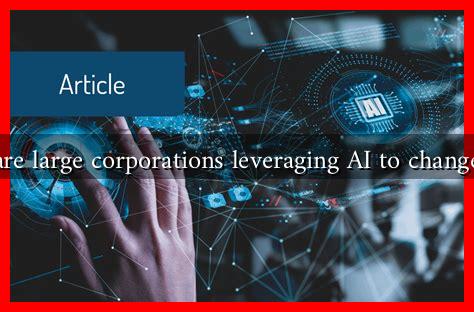-
Table of Contents
How Are Large Corporations Leveraging AI to Change Jobs?
Artificial Intelligence (AI) is no longer a futuristic concept; it has become a transformative force in the corporate world. Large corporations are increasingly adopting AI technologies to enhance efficiency, improve decision-making, and ultimately change the nature of jobs. This article explores how these organizations are leveraging AI, the implications for the workforce, and what this means for the future of work.
The Role of AI in Corporate Strategy
AI is being integrated into various aspects of corporate strategy, from operations to customer service. Companies are using AI to automate routine tasks, analyze vast amounts of data, and even predict market trends. This shift is not just about replacing human labor; it’s about augmenting human capabilities and creating new job roles.
Automation of Routine Tasks
One of the most significant impacts of AI is the automation of repetitive tasks. Large corporations are deploying AI systems to handle mundane activities, allowing employees to focus on more strategic initiatives. For example:
- Manufacturing: Companies like General Motors are using AI-driven robots to assemble vehicles, which increases efficiency and reduces human error.
- Finance: JPMorgan Chase employs AI algorithms to analyze legal documents, significantly reducing the time lawyers spend on contract review.
- Retail: Amazon uses AI for inventory management and customer service chatbots, streamlining operations and enhancing customer experience.
Data-Driven Decision Making
AI enables corporations to make data-driven decisions by analyzing large datasets quickly and accurately. This capability is transforming roles across various sectors:
- Marketing: Companies like Netflix use AI to analyze viewer preferences, allowing them to tailor content recommendations and marketing strategies.
- Healthcare: IBM Watson Health leverages AI to analyze patient data, assisting healthcare professionals in diagnosing diseases more accurately.
- Supply Chain: Companies such as Walmart utilize AI to predict demand and optimize inventory levels, reducing waste and improving customer satisfaction.
Creation of New Job Roles
While AI may displace certain jobs, it also creates new opportunities. The demand for skilled professionals who can work alongside AI technologies is on the rise. Some emerging roles include:
- AI Ethicists: As AI becomes more prevalent, companies need professionals to address ethical concerns related to AI deployment.
- Data Scientists: Organizations require experts to interpret data and derive actionable insights from AI systems.
- AI Trainers: These professionals are responsible for training AI systems, ensuring they learn accurately and effectively.
Case Studies: Success Stories
Several large corporations have successfully integrated AI into their operations, showcasing the potential benefits:
- Google: The tech giant uses AI for various applications, including search algorithms and advertising, resulting in increased efficiency and revenue.
- Siemens: By implementing AI in manufacturing processes, Siemens has improved production efficiency by up to 20%.
- Unilever: The company employs AI for talent acquisition, using algorithms to screen resumes and identify the best candidates, thus speeding up the hiring process.
The Future of Work: Challenges and Opportunities
As AI continues to evolve, it presents both challenges and opportunities for the workforce. Companies must navigate the following:
- Reskilling and Upskilling: Organizations need to invest in training programs to help employees adapt to new technologies.
- Job Displacement: While some jobs will be lost, others will emerge, necessitating a shift in workforce planning.
- Workplace Culture: Companies must foster a culture that embraces change and innovation to remain competitive.
Conclusion
Large corporations are leveraging AI to transform jobs in profound ways. By automating routine tasks, enhancing data-driven decision-making, and creating new roles, AI is reshaping the corporate landscape. While challenges such as job displacement and the need for reskilling exist, the opportunities for innovation and growth are immense. As we move forward, it is crucial for organizations to embrace AI responsibly and prepare their workforce for the future of work.
For more insights on AI in the workplace, you can visit Forbes.

